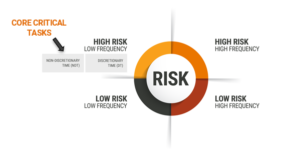Editor’s note: This article is part of a series. Click here for the previous article.
Gordon Graham here. Happy New Year to you and all close to you!
In my closing comments in my last article, I talked about the terrorist attack in Strasbourg. Not long after that incident, another terrorist attack, this time in Manchester, England, where several people were stabbed at Victoria Station. There were serious injuries but no fatalities—I guess that is the best possible news out of this type of incident.
Terrorist attacks are “high-risk, low-frequency” events—and I certainly hope they never move to the “high-risk, high-frequency” quadrant on the risk/frequency analysis. Regardless, it’s essential you and your personnel are prepared for such attacks.
But back to the focus for this article—what do you do when you get involved in a “high-risk, low-frequency” event that allows you time to think? Let me tell you the end of the story up front. If you have time to think—use it! I will beat this to death for the rest of this writing and probably into the next piece also.
First, let’s take another look at the risk/frequency chart:
Note that the top left quadrant has been divided into two areas. For the last several articles, I have tried to get you to think about the “core critical tasks”—very risky, done very rarely, with no time to think. These are the tasks labeled NDT—no discretionary time. They require constant and ongoing training.
But my focus in this article is the other side of the top left quadrant—events that are very risky, done very rarely—but give you time to think. What do you do then? Why is this such a big deal to me? Why am I using your valuable time to cover this issue?
Because failure to use discretionary time when available is over-represented in subsequent tragedies.
Let’s start with something important—and I will address this in subsequent articles when we arrive at Family Seven (Human Resources) in this series addressing the 10 Families of Risk.
If you don’t get anything else out of this writing, or this series of writings, please remember this for the rest of your career: All employment law is “discretionary time.” There is not one employment law decision you will ever make that needs to be done “right now.”
Do you really think you understand the FLSA (Fair Labor Standards Act)? Do you really think you fully understand the FMLA (Family and Medical Leave Act)? Do you think you understand the ADA (Americans with Disabilities Act)? What are the most recent developments regarding HIPAA and its impact on employment law? Can a bad employment law decision end up generating class action litigation? Do you fully understand that even if you win the case, the attorney’s fees can be in the millions of dollars?
Let me interrupt with a hypothetical situation for you. As you are pondering this article, you get notified of a major event now ongoing in your city. The incident involves barricaded suspects (number unknown, but possibly more than five according to witnesses) in a kindergarten with an entire class of children being held.
For most public safety agencies, HR is a huge liability risk and too many departments are paying out way too much money because of stupid employment law decisions made by good people who thought they knew.
The suspects are heavily armed terrorists. They have made many demands, including releasing certain “political prisoners” from the prisons in your state, a fully fueled jet, $10 million dollars in cash and a demand that their “terrorist manifesto” be broadcast on every television channel in your city. If their demands are not met, they have threatened to kill one child per hour while filming the event and live streaming it to social media.
Your SWAT team is on scene and they advise you the terrorists involved have drones monitoring police activity and access to police communications. There is evidence they have deployed bombs throughout the school that could be activated by a “dead man” ignition device. These bombs might contain a chemical or biological agent that will spread post-detonation.
You arrive on scene and because of your protocols you are in charge. Your brain is going 200 mph with all the problems you face and possible strategies to address the threats. As you consult with your tactical people regarding options, you are interrupted by a sergeant. The sergeant tells you they have HR personnel on the outer perimeter with some advice for you on how to handle this major event.
Obviously I am making all this up, but please think about this. If HR showed up on a major tactical incident with advice on how to do your job, you would be laughing your behind off! What the heck does HR know about barricaded suspects and terrorism?
That is exactly what the good people at Human Resources are thinking when you think you understand employment law. You are out of your league (just as HR is out of their league with respect to barricaded suspects) and you have no clue what you are doing!
Here I go again—if you do not get anything else out of this article or this series, please remember that all employment law is discretionary time in nature. Take the time to think and transfer the risk to the SMEs (subject matter experts) who do this at a higher frequency than you do.
For most public safety agencies, HR is a huge liability risk and too many departments are paying out way too much money because of stupid employment law decisions made by good people who thought they knew—when in reality they had no clue about how to handle an HR event.
Anyhow, I’m at my word count. I will continue this train of thought in our next time together.





